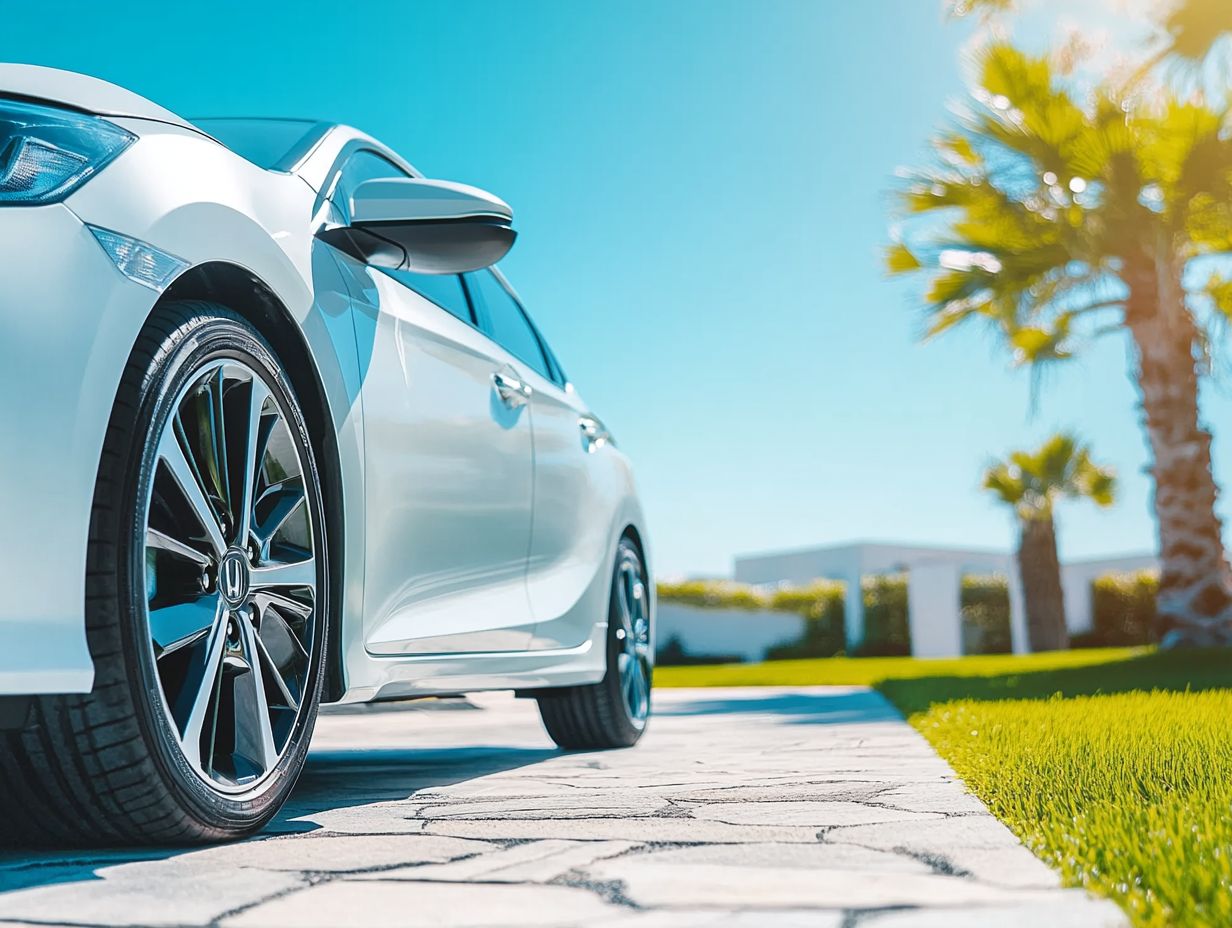The Importance of Comprehensive Coverage for New Cars
When you’re purchasing a new car, securing the right insurance becomes crucial for safeguarding your investment.
Comprehensive coverage provides a safety net against a wide range of risks, from theft and vandalism to unpredictable natural disasters. Grasping the intricacies of this coverage can empower you to make informed decisions about your policy.
This article delves into what comprehensive coverage truly entails, its myriad benefits, and how it stacks up against other types of insurance. You ll also discover valuable tips for selecting the best coverage tailored specifically to your needs.
Let’s explore how to keep your new car safe and sound!
Contents
- Key Takeaways:
- Understanding Comprehensive Coverage for New Cars
- Benefits of Comprehensive Coverage
- Factors to Consider When Choosing Comprehensive Coverage
- How Comprehensive Coverage Differs from Other Types of Car Insurance
- Tips for Getting the Best Comprehensive Coverage for Your New Car
- Frequently Asked Questions
- What is comprehensive coverage for new cars?
- Why is it important to have comprehensive coverage for new cars?
- Do I need comprehensive coverage if I have a new car warranty?
- Are there any exclusions to comprehensive coverage for new cars?
- Can I add comprehensive coverage to my existing car insurance policy?
- Is comprehensive coverage required for new cars?
Key Takeaways:

- Comprehensive coverage protects new cars from many different risks, making it a crucial investment for car owners.
- When choosing comprehensive coverage, consider costs, deductibles, and additional options to find the best fit for your needs and budget.
- Researching and comparing insurance providers can help you get the best comprehensive coverage for your new car.
Understanding Comprehensive Coverage for New Cars
Understanding comprehensive coverage for new cars is essential for you as a new car owner seeking robust protection against various risks. This type of insurance, typically paired with collision coverage, highlights the importance of coverage for new drivers and helps mitigate the financial burdens associated with vehicle damage from accidents, theft, or natural disasters.
Comprehensive insurance becomes especially crucial in states like New York and North Dakota, where weather-related incidents, such as hail or tornadoes, pose significant threats to your vehicle’s integrity. Investing in this coverage protects you from unpredictable weather and gives you peace of mind!
What is Comprehensive Coverage?
Comprehensive coverage is a vital type of auto insurance that shields you from various risks not typically covered by standard collision insurance. This includes protection against theft, vandalism, and damage caused by natural disasters.
If you’re looking to safeguard your vehicle from non-collision incidents think falling objects or encounters with animals this coverage is essential. Unlike collision insurance, which focuses solely on damages from vehicle collisions, comprehensive coverage addresses a range of unforeseen events.
A deductible is the amount you agree to pay for repairs before your insurance starts to help. Typical deductibles can vary, usually falling between $100 and $1,000. This gives you the flexibility to choose how much you’re comfortable paying out of pocket.
By integrating comprehensive coverage into your overall auto insurance policy, you create a more robust safety net against a multitude of potential risks.
Benefits of Comprehensive Coverage
The benefits of comprehensive coverage for electric cars are numerous, offering you peace of mind as a vehicle owner against unexpected incidents like theft, hail damage, or vandalism.
This type of insurance not only protects your vehicle but also significantly reduces the financial risk linked to unforeseen repairs and replacements.
Protection Against a Wide Range of Risks
Comprehensive insurance offers you protection against various risks that could threaten your vehicle, including theft, natural disasters like hurricanes or floods, and physical damage from hail or vandalism. This coverage is especially vital in areas prone to severe weather.
Just think about it: a single storm can wreak havoc on multiple vehicles, leaving owners with hefty repair bills or the disappointment of totaled cars. Imagine a scenario where a tree crashes onto your parked vehicle during a storm. Having comprehensive insurance can cover those repair costs, alleviating your financial burden.
With car theft on the rise, this insurance becomes even more essential. If the unthinkable happens and your vehicle is stolen, you won t face a total loss. This coverage not only protects the monetary value of your insured vehicle but also grants you peace of mind in uncertain circumstances.
Explore your options today and secure your peace of mind!
Factors to Consider When Choosing Comprehensive Coverage

When selecting Comprehensive Coverage for your new car, several key factors come into play. It’s important to consider the insurance costs, deductible amounts, and the importance of comprehensive liability coverage.
Understanding these elements is crucial. They can greatly influence your insurance choices and determine the overall financial protection for your vehicle.
Costs and Deductibles
The costs associated with Comprehensive Coverage can fluctuate significantly. Factors like deductible amounts and the specific costs for different types of coverage from various companies play a role.
Choosing a higher deductible can lead to lower premiums. This means you ll pay more out-of-pocket before insurance covers a claim.
On the flip side, opting for a lower deductible results in higher premiums, reflecting a reduced risk for the insurer.
To make the most of your budget, it s crucial to shop around and compare rates from various providers. You might discover that discounts for bundling policies or keeping a pristine driving record can lower your costs.
By understanding how these components interact, you can make informed decisions that strike the right balance between your coverage needs and your financial goals.
Additional Coverage Options
You might also want to explore additional coverage options like collision insurance and liability insurance to ensure your new car is fully protected.
These extra policies are essential for building a robust safety net for drivers like you. Collision insurance covers damages to your vehicle in case of accidents, whether you collide with another car or hit a stationary object like a tree.
Meanwhile, liability insurance shields you from legal responsibilities if you cause injury or property damage to others in an accident.
By combining these options with Comprehensive Insurance which covers non-collision incidents such as theft or natural disasters you not only meet legal requirements but also gain peace of mind. Feel confident knowing you ve crafted a solid strategy for handling unexpected events.
How Comprehensive Coverage Differs from Other Types of Car Insurance
Comprehensive coverage stands apart from other forms of car insurance, such as collision coverage and liability insurance. While collision coverage focuses solely on vehicle damage resulting from accidents, comprehensive coverage provides a broader safety net.
It protects you against non-collision-related risks, including theft and natural disasters, ensuring you re well-prepared for the unexpected.
Comparison to Liability and Collision Coverage
When you compare Comprehensive Insurance to liability insurance and collision coverage, it’s essential to recognize the differences. Collision coverage focuses on vehicle damage from accidents, while liability insurance handles damages to other vehicles and property.
This leaves a gap that Comprehensive Insurance effectively fills. It acts as your safety net against a broader spectrum of incidents, including theft, vandalism, and natural disasters.
Together, these insurance types create a robust auto policy that protects your financial security and helps mitigate the risks of vehicle ownership.
Each type of insurance serves a distinct purpose. Liability shields you from costs related to accidents involving others, while collision coverage ensures your personal vehicle is repaired after an accident.
By understanding how these policies work in harmony, you can make informed decisions that provide thorough protection on the road.
Tips for Getting the Best Comprehensive Coverage for Your New Car

To ensure you receive the most comprehensive coverage for your new car, it’s wise to research different car insurance companies and gather insurance quotes. Understanding the importance of coverage when selling your car can also provide valuable insights during your search.
Consulting with an insurance agent can also help. This approach will help you understand your options thoroughly, enabling you to make a well-informed decision regarding your insurance needs.
Don’t wait! Start comparing quotes today to find the best coverage!
Researching and Comparing Insurance Providers
Researching and comparing insurance providers is essential when pursuing Comprehensive Insurance. Different car insurance companies offer a range of quotes and auto insurance rates for similar coverage.
To secure the best policy, gather multiple quotes from various companies to understand the breadth of coverage and costs available. This includes examining the premiums and diving into the specifics of what each plan covers, including liability limits and deductibles.
Factors that influence auto insurance rates like your driving history, credit score, and vehicle type can refine your search. Evaluating the reputation of each insurer through customer reviews and ratings will shed light on their reliability and customer service practices.
By following these steps, you can make a well-informed decision that aligns perfectly with your needs.
Understanding Policy Details and Exclusions
Understanding the details and exclusions of your Comprehensive Insurance policy is crucial. This ensures you know exactly what s covered and helps you avoid misunderstandings.
A lack of clarity can lead to serious financial consequences, especially during a crisis. Review specifics such as the types of coverage whether they cover liability, property damage, or personal injury to guarantee you re adequately protected.
Pay attention to any exclusions or conditions to avoid unexpected out-of-pocket expenses. When chatting with insurance agents, ask questions like, What s not covered under this policy? or Are there limits on specific types of coverage? This proactive approach fosters a deeper understanding and ensures you feel confident in your coverage choices.
Watch this video to learn more about comprehensive coverage.
Frequently Asked Questions
What is comprehensive coverage for new cars?
Comprehensive coverage is an insurance policy that protects new cars from a wide range of damages, including theft, vandalism, natural disasters, and accidents that are not considered collisions. To learn more about this type of protection, consider exploring understanding full coverage auto insurance.
Why is it important to have comprehensive coverage for new cars?

Having comprehensive coverage for safety for new cars provides financial protection and peace of mind against unexpected events. It also helps cover repairs or replacement for damages not caused by collisions.
Do I need comprehensive coverage if I have a new car warranty?
While a new car warranty covers certain damages, it typically does not provide the same level of protection as comprehensive coverage. Understanding the importance of strong coverage for new drivers ensures your new car is fully protected!
Are there any exclusions to comprehensive coverage for new cars?
Yes, exclusions exist, such as wear and tear, mechanical breakdowns, and intentional damage. Carefully reviewing your policy helps you understand what is and isn’t covered.
Can I add comprehensive coverage to my existing car insurance policy?
Yes, you can add it to your existing car insurance policy. Talk to your insurance provider to understand the cost and coverage options available.
Is comprehensive coverage required for new cars?
Comprehensive coverage is not required by law, but it is highly recommended for new cars. Without it, you may be responsible for covering damages or replacement costs out of pocket. To learn more about this, check out what coverage for new car purchases entails.






